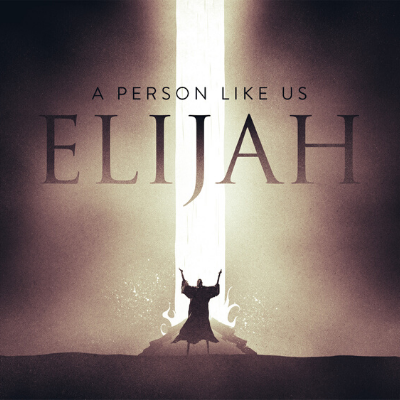SERMON SUMMARY
The Bible is filled with the wreckage and debris of men and women who have failed in the faith. This tells me that God, not man, is its ultimate author. We tend to gloss over our sins, but God doesn’t. God is a realist; when he portrays a man, he paints him warts and all. But these accounts of failure also tell me that the God who stands behind this book is a God of grace. He wants us to profit from the failures of others. These accounts of failure are flashing red lights, saying: “Watch Out! Caution! Danger! Beware!” It’s much more pleasant to learn from others’ mistakes than from our own!
Elijah’s life teaches that victory makes us vulnerable (1 Kings 19). It gives us a false sense of invulnerability, so we lower our guard (1 Corinthians 10:12). At the very point that you think you are strongest, you become most vulnerable. We have seen Elijah at his highest (1 Kings 18), and now we see him at his lowest. The fact that these two extremes are so chronologically close is a key in understanding this passage. Victory, followed quickly by defeat. Elijah had two complaints:
[1] “I am not appreciated.” (1 Kings 19:1-4) King Ahab told Jezebel the bad news that Yahweh had prevailed, and now all the prophets of Baal were dead (v. 1). At this, Jezebel sprang into action (v. 2). Jezebel threatened Elijah, swearing that he would be dead in twenty-four hours. (She knew that his popularity was so great that rash action on her part could backfire. When Elijah received this message, he panicked and fled south to Beersheba—120 miles away! He’s so paranoid, he left his servant there and fled even further south (v. 3-4a). How his circumstances have changed: one day ago he was on Mt. Carmel, calling down fire from heaven. And now he’s saying, “God, take me home—I’m done!” Elijah is saying, “I don’t deserve to be treated like this!“
Two things contributed to his feelings of self-pity:
- Elijah was looking at his circumstances. Elijah is looking through the wrong end of the telescope—Yahweh is small and Jezebel is huge! The moment Elijah took his eyes off of God he lost every ounce of courage.
- Elijah was physically and emotionally drained. Just think what Elijah’s been through: a tremendously exhilarating, but equally exhausting, experience. That can lead to a vulnerable time for any of us. That’s why I never make an important decision when I’m tired. It is amazing what a good night’s sleep can do to renew one’s spiritual perspective. Don’t forget—we have both body and soul, and they affect each other. We burn the candle on both ends, and wonder why we aren’t demonstrating the fruit of the Spirit. We are more spiritually vulnerable when we are emotionally or physically exhausted. Through Christian fellowship we come alongside each other to strengthen, encourage and restore (Galatians 6:1-2). Are you engaged in that kind of ministry to others? You should be.
[2] “I am indispensable.” (1 Kings 19:9-10) Elijah complained: “Lord, what in the world will you do when I pass off the scene? I’m all you’ve got, and I’m indispensable.” It is interesting how we can distort facts—remember: all the people rose up and said, “The Lord, He is God!” (1 Kings 18:39). Now Elijah is saying, “Lord, I’m the only one left.” But when you are emotionally distraught, when you are physically shot, everything looks distorted. And then he says, “And they seek my life”—suddenly one person, Jezebel, becomes the whole nation. Yet God was gracious, giving Elijah a revelation of his person and of his power, as a means to restoring Elijah (19:11-13). Even at this, Elijah has learned nothing, repeating what he said earlier (19:14 cf. 10). God gave Elijah this tremendous revelation to try to help him regain perspective, but he wasn’t paying attention. That’s what we do too: we replay pity-party tapes in our heads, rehearsing our complaints, hurts, and all the ways we’ve been mistreated and unappreciated. Notice how many times the pronouns, “I”, “me” and “my” show up in chapter 19. They were all but absent in chapters 17-18. But God never rebuts the prophet; he just give him a new assignment (v. 15-16). God delights to use us, but don’t ever think your work is indispensable. Overestimating our importance is a virus that infects many of God’s servants. As we come to the end of our study of Elijah, God not only encourages us through his experiences, but he also provides a warning.
APPLICATION / CHALLENGE
- Remember that the Christian life is a marathon, not a sprint. A good start does not guarantee a successful finish. Make it your goal to finish well.
- Realize that past successes can set us up emotionally for spiritual let downs. After so much success, Elijah’s failure should serve as flashing red lights which say, “Watch Out! Caution! Danger! Beware!”
- Feeling unappreciated can set us up for a spiritual decline. When you catch yourself thinking, “I’m not adequately appreciated around here!”, realize that’s pride talking. Be amazed that God even chooses to use us at all. Be satisfied to wait for God to say, “Well done, good and faithful servant. Enter into the joy of your master.”
TAKE ONE STEP
Each week, write down one doable concrete step of obedience, small or large, that you will put into practice this week. (James 1:22: “But prove yourselves doers of the word, and not merely hearers who delude themselves.”)


